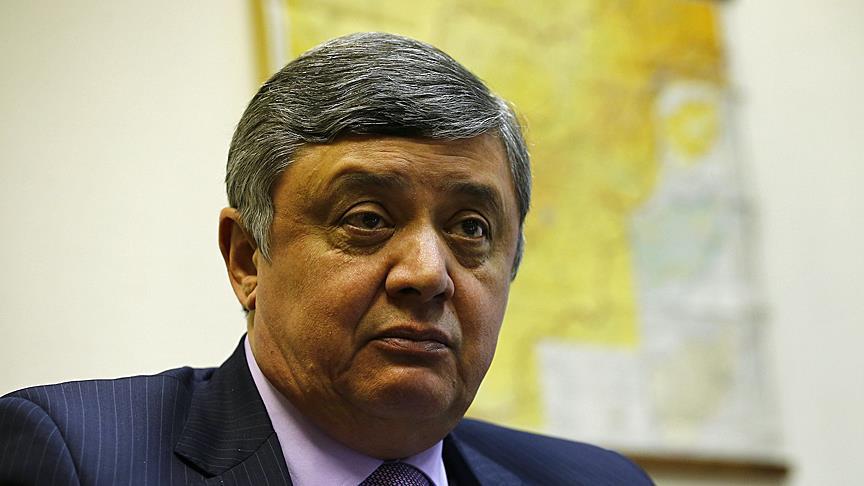Soviet Afghan war made radical groups: Russian diplomat
Putin’s envoy to Afghanistan says idea that Soviet Union came to eliminate Islam encouraged many people to go fight there
 Russian presidential envoy to Afghanistan Zamir Kabulov speaks to media in Moscow, Russia on November 15, 2016. ( Sefa Karacan - Anadolu Agency)
Russian presidential envoy to Afghanistan Zamir Kabulov speaks to media in Moscow, Russia on November 15, 2016. ( Sefa Karacan - Anadolu Agency)
By Mehmet Ozturk and A. Humeyra Atilgan
MOSCOW
Russia’s presidential envoy to Afghanistan admits that destabilization in the country following the 1979 Soviet invasion might have led to the emergence of radical groups such as al-Qaeda and Daesh.
“One of the main slogans of support for Afghanistan [during the invasion] was that the Soviet Union came to eliminate Islam. So it was a good enough slogan,” Zamir Kabulov, President Vladimir Putin's special envoy to Afghanistan and director of the Foreign Ministry's Second Asian Department, told Anadolu Agency in an exclusive interview in Moscow.
Kabulov said such slogans encouraged many people to go to fight in Afghanistan and do their jihad there.
“Osama bin Laden, a Yemeni-origin Saudi citizen, and many others who were unhappy with things going on in the Muslim world wanted to meet the challenges, including the ones that they saw as a threat to Islam.”
“Afghanistan became a convenient place for like-minded people to meet,” he said, adding that those people “added even more destabilization” to the country.
‘The same language as Daesh’
About the Taliban today being a local entity or an internationally managed group, Kabulov said it is predominately a local force.
“First of all, the Taliban is not homogenous. Within the Taliban, there are different wings with almost different ideological backgrounds.”
He said the Taliban was speaking “the same language that Daesh speaks today.”
“The same scenario, same ideology, different people,” he says, recalling seeing an “Islamic caliphate” map in Afghanistan which he said included Afghanistan, some countries in The Middle East, parts of India, Central Asia, and reached “almost up to our suburbs of Moscow.”
He said that within today’s Taliban there are very influential groups “whose ideology is more radical, closer to Daesh.”
However, he added, the current leadership and majority of Taliban now is a local force.
“As a result of all the historical lessons they got in Afghanistan, they gave up the global jihadism idea. They are upset and regret that they followed Osama bin Laden [...] They are now fighting the enemies of Islam and occupiers and want a government that will serve the Islamic nation.”
Stating that the threat of al-Qaeda has been downsized but not eliminated, Kabulov said: “Daesh as the rival of al-Qaeda operates much more smartly. It learned from all the mistakes of al-Qaeda.”
The Russian diplomat said Daesh and similar threats will exist until all the problems of the world are solved. “I mean [as long as] the Muslim world feels curbed by the Western world, and [as long as] the leaders of some Muslim countries are very rich but the people are not.”
Bases and rocket launchers
The Soviet invasion of Afghanistan began on Dec. 27, 1979 and ended almost 10 years later, leaving thousands of – or nearly a million – civilians dead, along with some 90,000 mujahideen fighters, 18,000 Afghan troops, and 14,500 Soviet soldiers.
Kabulov rejects the assertion that as many as one million Afghans were killed during the conflict, noting that neither Russia nor the other countries involved kept a precise record of casualties.
The "one million casualties" figure, he says, was "invented by the Americans" later in order to portray the Russians as "butchers".
On the reasons for the invasion, Kabulov said these were partly related to the Cold war-era perceptions.
"Technology was not like today; military bases and rocket launchers were very important," he said. "It was a matter of concern for us, too."
The Soviet Union’s Communist leadership might have been "scared of a possible American takeover of Afghanistan," Kabulov said.
Saying that "good relations" and "economic interaction with Afghanistan started in the early 1950s," he said the decolonization of India and Pakistan was another factor behind the invasion.
Kabulov, however, rejected the idea that the Soviets might also have been considering invading Pakistan, even though the Afghan resistance made it their logistical base.
"I never heard anybody discussing that," he said.
“I think the Soviet leadership realized the perils of such a thing, [that it] might trigger a bigger war and conflicts – after all, Pakistan already had nuclear warheads.”
He added, however, that the issue of how to eliminate danger within Pakistan is "of course an operative discussion."
Regarding Pakistan’s going nuclear over time, Kabulov said the country had “a lot of friends like the United States and China.”
“The Soviet Union was not a friend of Pakistan,” he said, adding, "but the presence of Afghanistan was important."
On the end of the almost decade-long invasion, Kabulov said it was mainly due to "the unpopularity of the war inside” at home.
He said that the military involvement in Afghanistan added to the structural problems inside Soviet Union, "but it was not decisive."
"Our military presence in Afghanistan was seen as an obstacle to the development of the Soviet Union," he noted.
Anadolu Agency website contains only a portion of the news stories offered to subscribers in the AA News Broadcasting System (HAS), and in summarized form. Please contact us for subscription options.







